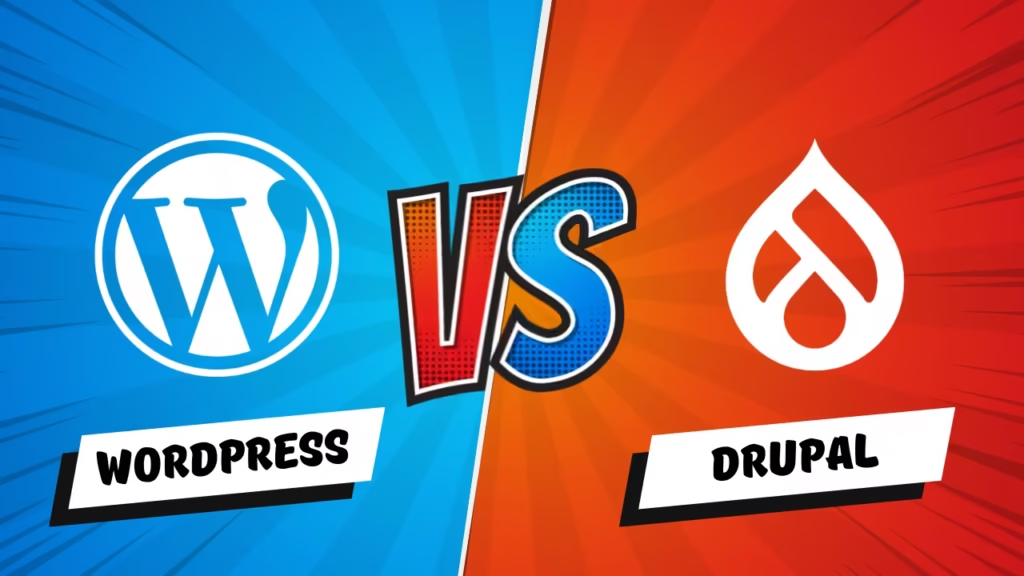For businesses aiming to build a scalable and secure online presence, selecting the right content management system (CMS) is essential. WordPress vs Drupal — which platform is the best CMS? Although market share and ease of use are both on WordPress’s side, Drupal is used for more secure, more complex sites.
This comparison will guide your WordPress vs. Drupal decision-making by looking at such features; market trends, usability, security and customization, SEO, costs and e-commerce.
Market Share & Popularity in 2025
WordPress: Still the Market Leader
Latest 2025 WordPress Market Share: 43.6% of all websites. It is still the best option for a CMS, thanks to its ease of use, extensive plugin library, and flexibility. It’s an easy solution for businesses, bloggers, and even e-commerce store owners to create and manage their websites
And just like that, WordPress keeps rising up to the challenge with updates and iterations. The best part is that it integrates with third-party applications and marketing tools—which makes it an excellent choice for scaling businesses
Drupal: A Niche Yet Powerful CMS
Drupal is a powerhouse CMS, with around 1.3% market share, and caters to government agencies, big corporations, and universities. The high-grade security and advanced customization features make it a perfect fit for ccomplicated projects needing very high-security compliance and highly scalable
Drupal is harder to learn but gives developers full flexibility when they need full control over their site’s architecture. It is the premium choice for complex projects with unique requirements, but can allow for a highly customized site through its modular approach.
Recommendation: For those seeking a well-supported CMS that is easy to learn, WordPress is the winner. Drupal is an option for organizations with high security and advanced development needs.
WordPress vs. Drupal: Which CMS is More Beginner-Friendly?
WordPress: Designed for Simplicity
- WordPress allows you to create preferably with the Gutenberg block editor and web page builders e.g., Elementor, utilizing a drag-and-drop interface.
- A fully-fledged website can be created without any coding knowledge.
- Adding features is practically seamless through over 59,000 plugins.
- Well-documented and supported by massive community.
Drupal: Best for Developers
- Drupal requires PHP, HTML, and CSS knowledge.
- The admin interface is complex compared to WordPress.
- Module-based structure allows deeper customization but comes with a steeper learning curve.
- More manual effort is needed for basic website functions.
Recommendation: WordPress is the clear winner for beginners and small business owners. If you have a development team, Drupal offers advanced customization.
WordPress vs. Drupal Security: Which One is More Secure?
WordPress: Secure with Proper Maintenance
- Frequent updates improve security but third-party plugins can introduce vulnerabilities.
- Security plugins like Wordfence and managed hosting enhance protection.
- Used by businesses worldwide but requires consistent maintenance.
Drupal: Built for Enterprise Security
- Offers enterprise-grade security, so this is the option for government agencies and financial institutions.
- Security features such as database encryption and enhanced access controls.
- Without third-party extensions there are fewer potential attack vectors.
- Regular security audits and patches mitigate vulnerabilities.
Recommendation: Drupal is more secure — use it if you need security. WordPress can be made very sole to security of course with the proper security arrangements.
Customization & Flexibility: Which CMS Offers More Freedom?
WordPress: Extensive Plugin and Theme Ecosystem
- Thousands of themes and plugins available for customization.
- Easy to extend functionality with WooCommerce, Elementor, and WPForms.
- Suitable for blogs, business websites, and e-commerce stores.
Drupal: Best for Complex Websites
- Highly flexible but requires PHP development skills.
- Provides deeper control over custom workflows and content structure.
- Used for large, high-traffic websites.
- Support multilingual support and enterprise-level content management.
Recommendation: WordPress is better for ease of customization, while Drupal excels in advanced, enterprise-level custom solutions.
SEO Capabilities: Which CMS Ranks Better?
WordPress: SEO-Friendly with Plugins
- Plugins like Yoast SEO, Rank Math, and All-in-One SEO simplify optimisation.
- Mobile-optimized themes and fast-loading designs improve rankings.
- Strong support for structured data and schema markup.
Drupal: SEO Control for Developers
- Built-in taxonomy and structured content advantages.
- Offers fine-tuned SEO customization for developers.
- Requires manual optimization for best results.
- Great for websites that use complex content arrangement.
Recommendation: The best solution for businesses looking for simple-to-manage SEO is WordPress. For those that require technical SEO control, Drupal is a better option.
Cost & Maintenance: Which CMS is More Budget-Friendly?
WordPress: Affordable for Any Budget
- Free to use, but premium themes and plugins may add costs.
- Performance and security management are made easier with managed WordPress hosting.
- Perfect for bloggers, small businesses, and startups.
Drupal: Higher Development Costs
- Free to download, but requires professional development for customization.
- Higher hosting costs due to complex infrastructure needs.
- Suitable for large enterprises with a dedicated budget.
Recommendation: Compared to Drupal, WordPress is more affordable and simpler to maintain.
E-commerce Support: Which CMS is Better for Online Stores?
WordPress: WooCommerce Dominates
- More than 28% of all online stores are powered by WooCommerce.
- Simple integration with logistics providers, inventory management software, and payment gateways.
- Best suited for small to large-scale e-commerce businesses.
Drupal: Commerce for Enterprises
- Drupal Commerce is powerful but requires development expertise.
- Ideal for businesses in need of cutting-edge e-commerce support.
Recommendation: Because WooCommerce is so user-friendly, WordPress is the ideal option for the majority of e-commerce companies.
Final Verdict: WordPress vs. Drupal?
Who Should Use WordPress?
- Small businesses
- Bloggers & content creators
- E-commerce stores
- Anyone needing an easy-to-manage website
Who Should Use Drupal?
- Large enterprises
- Government and security-focused organizations
- Websites requiring custom workflows and high scalability
Need Expert Assistance? Contact Orbitweb Tech
The main limitations of WordPress vs. Drupal If you are looking for the best CMS that is affordable, SEO-friendly, and easy to manage, choose WordPress. But if you prioritize security, scalability, and customization, then you should definitely consider Drupal.
Website Development by Professionals? Go WebbyVivek is an official web solution to WordPress & Drupal that meets your business needs. Get in touch with us today to know more!





